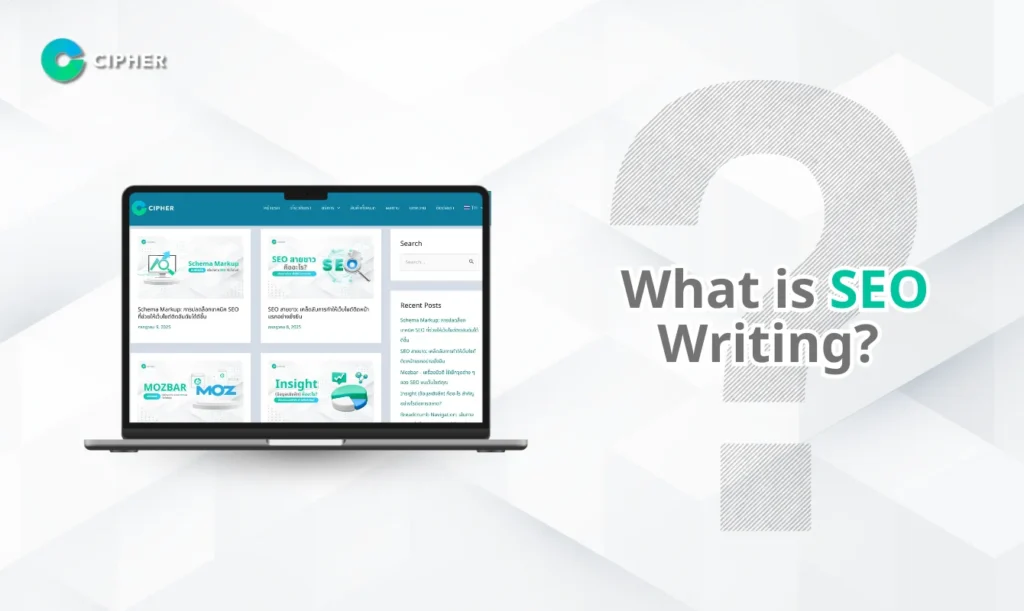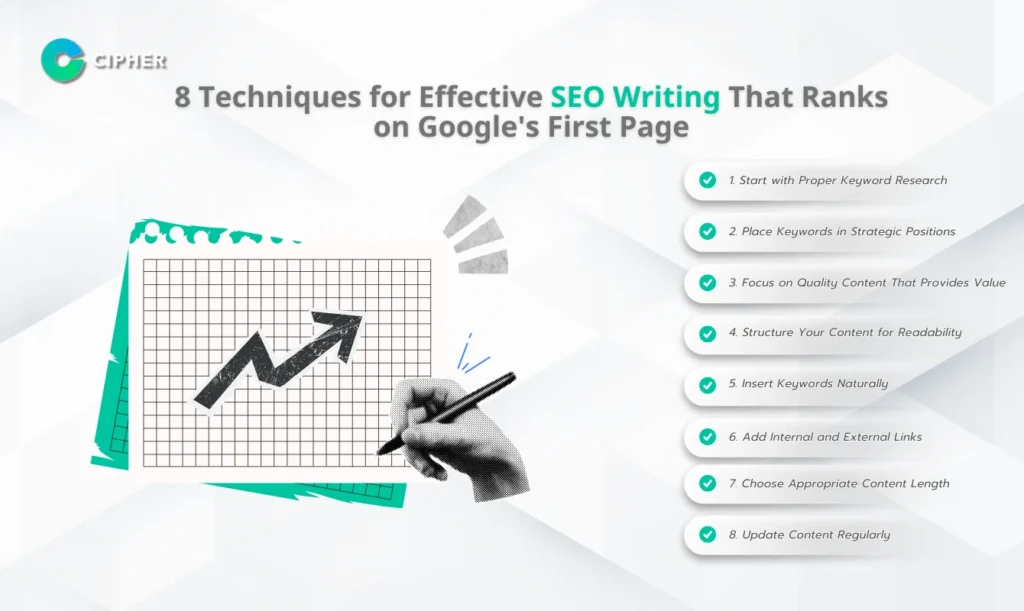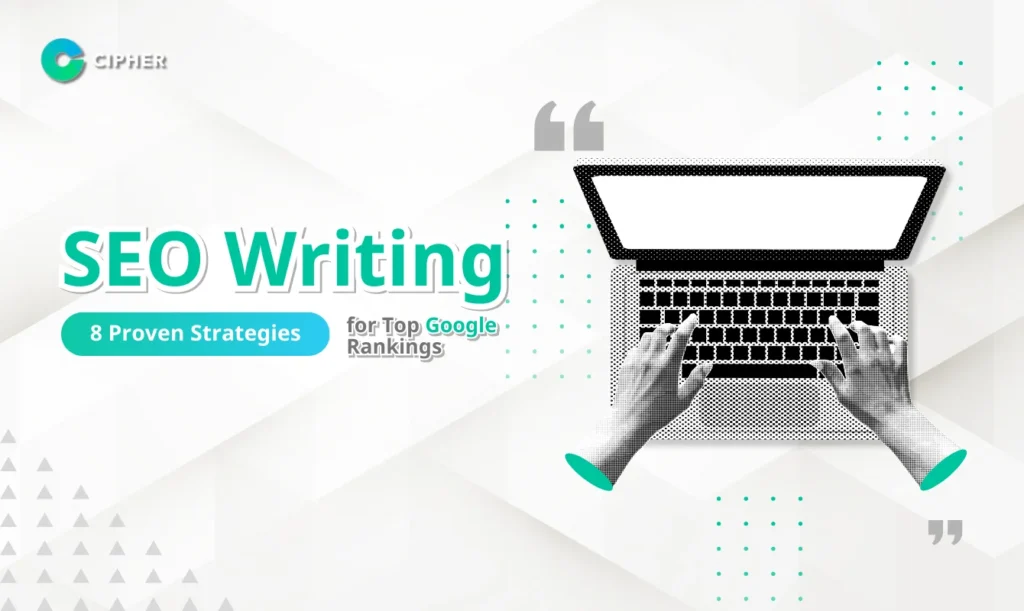Creating a website that ranks well on Google is crucial for all types of online businesses. The heart of effective Search Engine Optimization is high-quality SEO writing and strategic content development. But how do you create SEO content that attracts both readers and Google’s favor? This comprehensive guide will walk you through proven content writing for SEO techniques that will help propel your website to the first page of search results sustainably.
Table of Contents
What is SEO Writing? Why Is It Important?

SEO writing is the process of creating content that has been optimized according to search engine principles, particularly Google’s, with the goal of ranking high in search results when users type keywords related to your business. Effective content writing is therefore an essential part of any comprehensive digital marketing strategy.
Many people mistakenly believe that SEO content is about stuffing as many keywords as possible. In reality, professional SEO writing considers both reader needs and making content easily understood by search engines.
Why SEO content is important for online businesses:
- Increase organic traffic (visitors without paying for advertising) to your website
- Build credibility and brand awareness
- Reach target customers who are searching for your products or services
- Create more opportunities to close sales
- Provide long-term value, as good content writing for SEO can continuously bring traffic to your website
8 Techniques for Effective SEO Writing That Ranks on Google's First Page

1. Start with Proper Keyword Research
Before diving into SEO writing, the first step is finding appropriate keywords. Effective content writing for SEO begins with selecting good keywords that:
- Align with the article content: Keywords must match what the article discusses
- Have sufficient search volume: Find keywords that enough people are searching for
- Have appropriate competition: Keywords with excessive competition may be difficult to rank for, especially for new websites
You can use tools like Yoast SEO, SEO rank reporter, or others such as Google Keyword Planner, Ubersuggest, or Ahrefs to find suitable keywords for your SEO content. In addition to primary keywords, consider secondary or related keywords to increase ranking opportunities.
2. Place Keywords in Strategic Positions
Placing keywords in the right positions is crucial for effective SEO writing. Google’s algorithm gives special weight to keywords in these locations:
- Title (H1): The article title should include your main keyword to tell Google what the SEO content is about
- URL: Include keywords in the article link (preferably using English for better appearance)
- Meta description: The short description that appears below the article title in search results
- Subheadings (H2, H3): Include main or secondary keywords in article subheadings
- First paragraph: Try to include the main keyword in the article’s first paragraph
- Image Alt Text: Add keywords to image descriptions to help Google understand what the images are about
3. Focus on Quality Content That Provides Value
Good SEO writing prioritizes quality, not just keyword insertion. Effective content writing provides valuable information to readers. Google increasingly emphasizes User Experience, and quality SEO content helps keep readers on your site longer, reduce bounce rates, and send positive signals to Google.
Characteristics of quality content writing for SEO:
- Provide comprehensive information: Clearly and completely answer reader questions
- Easy to read and understand: Use simple language that’s not overly complex
- Have clear section divisions: Divide content into subsections for easier reading
- Be unique: Don’t copy or plagiarize content from other websites
- Keep information updated: Article information should be current
4. Structure Your Content for Readability
A good article structure not only helps readers understand content more easily but also helps Google better understand your SEO content. Effective SEO writing must therefore prioritize article structure.
Techniques for structuring content writing for readability:
- Use Header Tags (H1, H2, H3) appropriately: H1 for article title, H2 for main headings, H3 for subheadings
- Divide into short, concise paragraphs: Shorter paragraphs are easier to read than long ones
- Use Bullet Points or Numbered Lists: Help make information easier to read and understand
- Add images and videos: Increase interest and help explain content better
- Use bold, italic, or highlighting: Emphasize important text to attract reader attention
5. Insert Keywords Naturally
Keyword insertion must be done naturally in SEO writing. Don’t overuse keywords to the point where the SEO content reads awkwardly or feels forced. Google can detect “Keyword Stuffing” and may penalize websites that do this.
Guidelines for natural keyword insertion in content writing for SEO:
- Keyword density should not exceed 2.5% of the total content
- Distribute keywords throughout the article, not concentrated in just one section
- Use diverse keywords, both primary and secondary, including semantically related terms
- Review the article to ensure keyword usage doesn’t make it difficult to read or seem unnatural
6. Add Internal and External Links
Adding links in your SEO content adds value and positively affects search rankings. There are two main types of links:
- Internal Links: Links leading to other pages on the same website, helping readers access other relevant information easily and helping Google better understand your website structure
- External Links: Links leading to other websites, which should link to credible sites with relevant information. Referencing sources from trustworthy websites helps increase the credibility of your SEO writing
Effective use of links will increase website credibility and positively impact Google rankings, which you can track using tools like SEO rank reporter.
7. Choose Appropriate Content Length
The optimal length for SEO content is a much-debated topic. Some say longer articles rank better, while others say shorter articles can rank well too.
Guidelines for choosing article length in content writing for SEO:
- Not too short: Articles with too little content may not provide readers with comprehensive information
- Not unnecessarily long: Articles that are too long without valuable content aren’t good for SEO
- Appropriate length: SEO writing should be approximately 800-1,500 words, or as appropriate for the content
In summary, article length should depend on the content and topic. Complex topics may require longer SEO content for comprehensive explanation, while simpler topics may not need lengthy articles.
8. Update Content Regularly
Google favors fresh content that’s regularly updated. Updating old SEO content with new information or adding valuable content can help keep your articles fresh and improve rankings.
Effective ways to update your SEO writing:
- Add new information: Add new data, statistics, or examples
- Fix outdated information: Check and update information that’s no longer current
- Improve formatting: Make articles easier to read by improving formatting
- Add images or videos: Add interesting media to attract readers
- Check and improve links: Fix broken links and add new relevant links
Additionally, focus on improving Core Web Vitals to enhance website performance, which you can monitor using SEO rank reporter tools to see how these changes impact your rankings.
Essential Components of Effective SEO Writing
Title
The title is the first thing readers and Google see, so it should be interesting and include the main keyword. A good title for SEO content should:
- Be approximately 50-60 characters long
- Have the main keyword near the beginning
- Tell readers what the article is about
- Attract reader interest
Meta Description
The meta description is the short text that appears below the article title in search results. It’s important for attracting users to click and read your SEO writing. A good description should:
- Be approximately 150-160 characters long
- Include the main keyword
- Tell readers what they’ll get from this article
- Include a call to action
Header Tags (H1, H2, H3)
Header tags help organize content and make articles easier to read. They also help Google better understand your SEO content structure:
- H1: Used for article title, should have only one per article
- H2: Used for main headings
- H3: Used for subheadings under H2
- H4-H6: Used for further subheadings (if necessary)
Images and Alt Text
Images add interest to SEO content and help explain content better. Alt text is the image description that appears when an image can’t be displayed and helps Google understand what the image is about:
- Images should be relevant to the content
- Alt text should have clear descriptions and include keywords
- Image filenames should be meaningful and include keywords (e.g., “seo-writing-tips.jpg” instead of “IMG12345.jpg”)
URL (Slug)
The article URL should be short, concise, and include keywords relevant to your SEO writing
- Use English for better appearance and to avoid “foreign language” issues when sharing links
- Avoid unnecessary words like “the,” “a,” “an,” etc.
- Use hyphens (-) instead of spaces
- Keep it short and readable
Professional SEO Content Writing Services by CIPHER
Creating effective SEO content can be challenging for those without experience or sufficient time. CIPHER is ready to help you with professional content writing for SEO services.
Why choose CIPHER's SEO writing services?
- Professional writer team: We have a team of writers with experience and expertise in SEO writing across various industries
- Professional writer team: We have a team of writers with experience and expertise in SEO writing across various industries
- Professional keyword research: We conduct detailed keyword research to give your SEO content high ranking potential
- Quality guarantee: We guarantee high-quality, non-plagiarized articles that pass strict quality checks
- Customize articles to target audiences: We tailor content writing to your target audience, ensuring they not only rank well but also attract customers and generate conversions effectively
Our SEO writing services
- Monthly article writing packages: Suitable for businesses needing continuous SEO content updates
- Special-purpose article writing: For businesses needing specific content writing for SEO for special purposes
- Existing article improvement: Help improve old articles to align with SEO principles and update information
- Content strategy planning: Help plan long-term digital marketing strategies for sustainable website growth
Contact us today at 081-633-3636 for consultation and customized quotes to meet your SEO needs.





